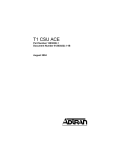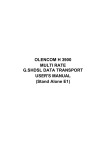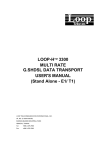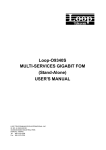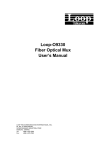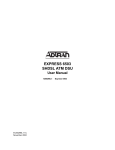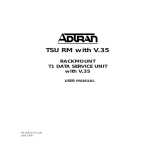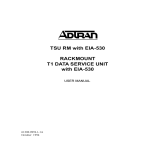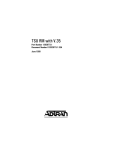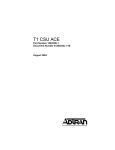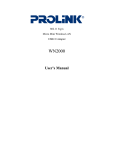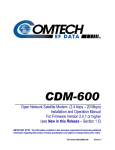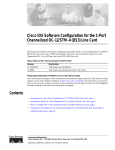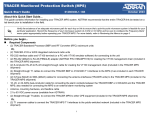Download T1 Esf Csu Rm
Transcript
T1 ESF CSU RM Rackmount 1 Extended Superframe Format Channel Service Unit Part Number 1202066L1 61202066L1-1B February 2003 Trademarks Any brand names and product names included in this manual are trademarks, registered trademarks, or trade names of their respective holders. To the Holder of the Manual The contents of this manual are current as of the date of publication. ADTRAN reserves the right to change the contents without prior notice. In no event will ADTRAN be liable for any special, incidental, or consequential damages or for commercial losses even if ADTRAN has been advised thereof as a result of issue of this publication. 901 Explorer Boulevard P.O. Box 140000 Huntsville, AL 35814-4000 (256) 963-8000 © 2003 ADTRAN, Inc. All Rights Reserved. Printed in U.S.A. About this Manual The following conventions are used in this manual. Cautions signify information that could prevent service interruption. Notes provide additional useful information. Warnings provide information that could prevent damage to the equipment or endangerment to human life. Safety Instructions When using your telephone equipment, please follow these basic safety precautions to reduce the risk of fire, electrical shock, or personal injury: 1. Do not use this product near water, such as a bathtub, wash bowl, kitchen sink, laundry tub, in a wet basement, or near a swimming pool. 2. Avoid using a telephone (other than a cordless-type) during an electrical storm. There is a remote risk of shock from lightning. 3. Do not use the telephone to report a gas leak in the vicinity of the leak. 4. Use only the power cord, power supply, and/or batteries indicated in the manual. Do not dispose of batteries in a fire. They may explode. Check with local codes for special disposal instructions. Save These Important Safety Instructions 61202066L1-1B T1 ESF CSU Rackmount User Manual 3 Affidavit Requirements for Connection to Digital Services • • • An affidavit is required to be given to the telephone company whenever digital terminal equipment without encoded analog content and billing protection is used to transmit digital signals containing encoded analog content which are intended for eventual conversion into voiceband analog signals and transmitted on the network. The affidavit shall affirm that either no encoded analog content or billing information is being transmitted or that the output of the device meets Part 68 encoded analog content or billing protection specifications. End user/customer will be responsible for filing an affidavit with the local exchange carrier when connecting unprotected customer premise equipment (CPE) to 1.544 Mbps or subrate digital services. Until such time as subrate digital terminal equipment is registered for voice applications, the affidavit requirement for subrate services is waived. 4 T1 ESF CSU Rackmount User Manual 61202066L1-1B Affidavit for Connection of Customer Premises Equipment to 1.544 MBPS and/or Subrate Digital Services For the work to be performed in the certified territory of ______________ (telco name) State of ________________________________ County of ______________________________ I, _______________________ (name), ____________________ (business address), _____________________ (telephone number) being duly sworn, state: I have the responsibility for the operation and maintenance of the terminal equipment to be connected to 1.544 Mbps and/or __________________ subrate digital services. The terminal equipment to be connected complies with Part 68 of the FCC rules except for the encoded analog content and billing protection specification. With respect to encoded analog content and billing protection: ( ) I attest that all operations associated with the establishment, maintenance and adjustment of the digital CPE with respect to encoded analog content and billing protection information continuously complies with Part 68 of the FCC rules and Regulations. ( ) The digital CPE does not transmit digital signals containing encoded analog content or billing information which is intended to be decoded within the telecommunications network. ( ) The encoded analog content and billing protection is factory set and is not under the control of the customer. I attest that the operator(s) maintainer(s) of the digital CPE responsible for the establishment, maintenance and adjustment of the encoded analog content and billing information has (have) been trained to perform these functions by successfully having completed one of the following (check appropriate blocks): ( ) A. A training course provided by the manufacturer/grantee of the equipment used to encode analog signals; or 61202066L1-1B T1 ESF CSU Rackmount User Manual 5 ( ) B. A training course provided by the customer or authorized representative, using training materials and instructions provided by the manufacturer/grantee of the equipment used to encode analog signals; or ( ) C. An independent training course (e.g., trade school or technical institution) recognized by the manufacturer/grantee of the equipment used to encode analog signals; or ( ) D. In lieu of the proceeding training requirements, the operator(s)/maintainer(S) is (are) under the control of a supervisor trained in accordance with _______________ (circle one) above. I agree to provide ____________________ (telco’s name) with proper documentation to demonstrate compliance with the information in the preceding paragraph, if so requested. _____________________ Signature _____________________ Title _____________________ Date Subscribed and sworn to before me This _________ day of ___________________, 20__ _______________________________________ Notary Public My commission expires: _________________________ 6 T1 ESF CSU Rackmount User Manual 61202066L1-1B FCC regulations require that the following information be provided in this manual: 1. This equipment complies with Part 68 of FCC rules. On the back of the equipment housing is a label showing the FCC registration number and ringer equivalence number (REN). If requested, provide this information to the telephone company. 2. If this equipment causes harm to the telephone network, the telephone company may temporarily discontinue service. If possible, advance notification is given; otherwise, notification is given as soon as possible. The telephone company will advise the customer of the right to file a complaint with the FCC. 3. The telephone company may make changes in its facilities, equipment, operations, or procedures that could affect the proper operation of this equipment. Advance notification and the opportunity to maintain uninterrupted service are given. 4. If experiencing difficulty with this equipment, please contact ADTRAN for repair and warranty information. The telephone company may require this equipment to be disconnected from the network until the problem is corrected or it is certain the equipment is not malfunctioning. 5. This unit contains no user-serviceable parts. 6. An FCC compliant telephone cord with a modular plug is provided with this equipment. This equipment is designed to be connected to the telephone network or premises wiring using an FCC compatible modular jack, which is Part 68 compliant. 7. The following information may be required when applying to the local telephone company for a leased line facilities: Service Type 1.544 Mbps SF without line power Digital Facility Interface Code Service Order Code Network Jacks 04DU9-BN 6.0N RJ-48C 1.544 Mbps ANSI ESF without line power 04DU9-DN 6.0N RJ-48C 1.544 Mbps ANSI ESF and B8ZS without line power 04DU9-IKN 6.0N RJ-48C 1.544 Mbps SF and B8ZS without line power 04DU9-ISN 6.0N RJ-48C 8. The REN is useful in determining the quantity of devices you may connect to your telephone line and still have all of those devices ring when your number is called. In most areas, the sum of the RENs of all devices should not exceed five. To be certain of the number of devices you may connect to your line as determined by the REN, call your telephone company to determine the maximum REN for your calling area. 61202066L1-1B T1 ESF CSU Rackmount User Manual 7 9. This equipment may not be used on coin service provided by the telephone company. Connection to party lines is subject to state tariffs. Contact your state public utility commission or corporation commission for information. Federal Communications Commission Radio Frequency Interference Statement This equipment has been tested and found to comply with the limits for a Class A digital device, pursuant to Part 15 of the FCC Rules. These limits are designed to provide reasonable protection against harmful interference when the equipment is operated in a commercial environment. This equipment generates, uses, and can radiate radio frequency energy and, if not installed and used in accordance with the instruction manual, may cause harmful interference to radio frequencies. Operation of this equipment in a residential area is likely to cause harmful interference in which case the user will be required to correct the interference at his own expense. Shielded cables must be used with this unit to ensure compliance with Class A FCC limits. Changes or modifications to this unit not expressly approved by the party responsible for compliance could void the user’s authority to operate the equipment. 8 T1 ESF CSU Rackmount User Manual 61202066L1-1B Industry Canada Compliance Information Notice: The Industry Canada label applied to the product (identified by the Industry Canada logo or the “IC:” in front of the certification/registration number) signifies that the Industry Canada technical specifications were met. Notice: The Ringer Equivalence Number (REN) for this terminal equipment is supplied in the documentation or on the product labeling/markings. The REN assigned to each terminal device indicates the maximum number of terminals that can be connected to a telephone interface. The termination on an interface may consist of any combination of devices subject only to the requirement that the sum of the RENs of all the devices should not exceed five (5). Canadian Emissions Requirements This digital apparatus does not exceed the Class A limits for radio noise emissions from digital apparatus as set out in the interference-causing equipment standard entitled “Digital Apparatus,” ICES-003 of the Department of Communications. Cet appareil numérique respecte les limites de bruits radioelectriques applicables aux appareils numériques de Class A prescrites dans la norme sur le materiel brouilleur: “Appareils Numériques,” NMB-003 edictee par le ministre des Communications. Warranty and Customer Service ADTRAN will replace or repair this product within the warranty period if it does not meet its published specifications or fails while in service. Warranty information can be found at www.adtran.com/warranty. 61202066L1-1B T1 ESF CSU Rackmount User Manual 9 Customer Service, Product Support Information, and Training ADTRAN will replace or repair this product within the warranty period if it does not meet its published specifications or fails while in service. Warranty information can be found at www.adtran.com/warranty. A return material authorization (RMA) is required prior to returning equipment to ADTRAN. For service, RMA requests, training, or more information, use the contact information given below. Repair and Return If you determine that a repair is needed, please contact our Customer and Product Service (CAPS) department to have an RMA number issued. CAPS should also be contacted to obtain information regarding equipment currently in house or possible fees associated with repair. CAPS Department (256) 963-8722 Identify the RMA number clearly on the package (below address), and return to the following address: ADTRAN Customer and Product Service 901 Explorer Blvd. (East Tower) Huntsville, Alabama 35806 RMA # _____________ Pre-Sales Inquiries and Applications Support Your reseller should serve as the first point of contact for support. If additional presales support is needed, the ADTRAN Support web site provides a variety of support services such as a searchable knowledge base, latest product documentation, application briefs, case studies, and a link to submit a question to an Applications Engineer. All of this, and more, is available at: http://support.adtran.com 10 T1 ESF CSU Rackmount User Manual 61202066L1-1B When needed, further pre-sales assistance is available by calling our Applications Engineering Department. Applications Engineering (800) 615-1176 Post-Sale Support Your reseller should serve as the first point of contact for support. If additional support is needed, the ADTRAN Support web site provides a variety of support services such as a searchable knowledge base, updated firmware releases, latest product documentation, service request ticket generation and trouble-shooting tools. All of this, and more, is available at: http://support.adtran.com When needed, further post-sales assistance is available by calling our Technical Support Center. Please have your unit serial number available when you call. Technical Support (888) 4ADTRAN Installation and Maintenance Support The ADTRAN Custom Extended Services (ACES) program offers multiple types and levels of installation and maintenance services which allow you to choose the kind of assistance you need. This support is available at: http://www.adtran.com/aces For questions, call the ACES Help Desk. ACES Help Desk 61202066L1-1B (888) 874-ACES (2237) T1 ESF CSU Rackmount User Manual 11 Training The Enterprise Network (EN) Technical Training Department offers training on our most popular products. These courses include overviews on product features and functions while covering applications of ADTRAN’s product lines. ADTRAN provides a variety of training options, including customized training and courses taught at our facilities or at your site. For more information about training, please contact your Territory Manager or the Enterprise Training Coordinator. 12 Training Phone (800) 615-1176, ext. 7500 Training Fax (256) 963-6700 Training Email [email protected] T1 ESF CSU Rackmount User Manual 61202066L1-1B 61202066L1-1B T1 ESF CSU Rackmount User Manual 13 14 T1 ESF CSU Rackmount User Manual 61202066L1-1B Table of Contents Chapter 1: Introduction . . . . . . . . . . . . . . . . . . . . . . . . . . . . . . . . . . . . . . . 21 General Description . . . . . . . . . . . . . . . . . . . . . . . . . . . . . . . . . . . . . . . . . 21 Chapter 2: Physical Description . . . . . . . . . . . . . . . . . . . . . . . . . . . . . . . . . 23 Front Panel . . . . . . . . . . . . . . . . . . . . . . . . . . . . . . . . . . . . . . . . . . . . . . . . 23 Rear Panel . . . . . . . . . . . . . . . . . . . . . . . . . . . . . . . . . . . . . . . . . . . . . . . . . 26 Chapter 3: Installation . . . . . . . . . . . . . . . . . . . . . . . . . . . . . . . . . . . . . . . . 27 Unpacking . . . . . . . . . . . . . . . . . . . . . . . . . . . . . . . . . . . . . . . . . . . . . . . . . 27 Powering . . . . . . . . . . . . . . . . . . . . . . . . . . . . . . . . . . . . . . . . . . . . . . . . . . 27 Network and DTE Connections . . . . . . . . . . . . . . . . . . . . . . . . . . . . . . . . 28 Chapter 4: Operation . . . . . . . . . . . . . . . . . . . . . . . . . . . . . . . . . . . . . . . . . 29 Menu Structures . . . . . . . . . . . . . . . . . . . . . . . . . . . . . . . . . . . . . . . . . . . . 29 Configuration . . . . . . . . . . . . . . . . . . . . . . . . . . . . . . . . . . . . . . . . . . . . . . 30 Network Options. . . . . . . . . . . . . . . . . . . . . . . . . . . . . . . . . . . . . . . . . . . . 32 DTE Options . . . . . . . . . . . . . . . . . . . . . . . . . . . . . . . . . . . . . . . . . . . . . . . 35 Factory Restore . . . . . . . . . . . . . . . . . . . . . . . . . . . . . . . . . . . . . . . . . . . . . 36 Tests . . . . . . . . . . . . . . . . . . . . . . . . . . . . . . . . . . . . . . . . . . . . . . . . . . . . . 37 Self-Test . . . . . . . . . . . . . . . . . . . . . . . . . . . . . . . . . . . . . . . . . . . . . . . . . . 39 Local Loopbacks. . . . . . . . . . . . . . . . . . . . . . . . . . . . . . . . . . . . . . . . . . . . 39 Remote Loopbacks . . . . . . . . . . . . . . . . . . . . . . . . . . . . . . . . . . . . . . . . . . 41 Test Patterns . . . . . . . . . . . . . . . . . . . . . . . . . . . . . . . . . . . . . . . . . . . . . . . 41 Status. . . . . . . . . . . . . . . . . . . . . . . . . . . . . . . . . . . . . . . . . . . . . . . . . . . . . 42 Chapter 5: Specification Summary . . . . . . . . . . . . . . . . . . . . . . . . . . . . . . 47 61202066L1-1B T1 ESF CSU Rackmount User Manual 15 Table of Contents 16 T1 ESF CSU Rackmount User Manual 61202066L1-1B List of Figures Figure 2-1. Figure 2-2. Figure 4-1. Figure 4-2. Figure 4-3. Figure 4-4. Figure 4-5. Figure 4-6. Figure 4-7. Figure 4-8. Figure 4-9. Figure 4-10. Figure 4-11. Figure 4-12. Figure 4-13. Figure 4-14. Figure 4-15. Figure 4-16. Figure 4-17. Figure 4-18. Figure 4-19. 61202066L1-1B T1 ESF CSU Front Panel. . . . . . . . . . . . . . . . . . . . . . . . . . . . . . 25 T1 ESF CSU Rear Panel . . . . . . . . . . . . . . . . . . . . . . . . . . . . . . 26 Display of Terminal Main Menu . . . . . . . . . . . . . . . . . . . . . . . . 30 Display of DATAMATE Main Menu . . . . . . . . . . . . . . . . . . . . 30 Display of Terminal Configuration Menu . . . . . . . . . . . . . . . . . 31 DATAMATE Configuration Menu Tree . . . . . . . . . . . . . . . . . . 31 Display of Terminal Test Menu. . . . . . . . . . . . . . . . . . . . . . . . . 37 Display of Terminal Test Results . . . . . . . . . . . . . . . . . . . . . . . 37 DATAMATE Test Menu Tree . . . . . . . . . . . . . . . . . . . . . . . . . 38 Display of DATAMATE Test Results. . . . . . . . . . . . . . . . . . . . 38 Local Line Loopback . . . . . . . . . . . . . . . . . . . . . . . . . . . . . . . . . 40 Payload Loopback . . . . . . . . . . . . . . . . . . . . . . . . . . . . . . . . . . . 40 Local DTE Loopback. . . . . . . . . . . . . . . . . . . . . . . . . . . . . . . . . 41 Display of Terminal Status Selection . . . . . . . . . . . . . . . . . . . . 42 Terminal Status Display. . . . . . . . . . . . . . . . . . . . . . . . . . . . . . . 42 DATAMATE Status Menu Tree . . . . . . . . . . . . . . . . . . . . . . . . 43 DATAMATE Status Display Example . . . . . . . . . . . . . . . . . . . 43 DATAMATE Performance Monitoring Display Example . . . . 44 Display of Terminal Performance Monitoring Selection . . . . . 45 Display of Terminal Performance Summary . . . . . . . . . . . . . . . 45 Terminal Detailed Report Example . . . . . . . . . . . . . . . . . . . . . . 46 T1 ESF CSU Rackmount User Manual 17 List of Figures 18 T1 ESF CSU Rackmount User Manual 61202066L1-1B List of Tables Table 2-1. Alarm Conditions . . . . . . . . . . . . . . . . . . . . . . . . . . . . . . . . . . . . . 24 Table 3-1. Network RJ45 Pinout . . . . . . . . . . . . . . . . . . . . . . . . . . . . . . . . . . 28 Table 3-2. Equipment (EQ) RJ45 Pinout . . . . . . . . . . . . . . . . . . . . . . . . . . . . 28 Table 4-1. Network Factory Defaults . . . . . . . . . . . . . . . . . . . . . . . . . . . . . . . 36 Table 4-2. DTE Factory Defaults . . . . . . . . . . . . . . . . . . . . . . . . . . . . . . . . . . 36 61202066L1-1B T1 ESF CSU Rackmount User Manual 19 List of Tables 20 T1 ESF CSU Rackmount User Manual 61202066L1-1B Chapter 1 Introduction General Description Most carriers that supply T1 services require an interface to monitor the T1 line. The ADTRAN T1 ESF CSU RM (Extended Super Frame Channel Service Unit, rackmount), in either the stand alone or the rackmount version for the SMART 16 shelf, provides a reliable interface between the telco or private T1 facilities and the customer premises equipment (CPE), such as channel banks, T1 multiplexers, and PBXs. The T1 ESF CSU RM provides functions such as surge protection, signal regeneration, alarm displays, and loopbacks necessary for circuit operation. The unit provides the simultaneous use of performance report messages (PRMs) specified in ANSI T1.403 and maintenance messages specified in AT&T TR 54016. The T1 ESF CSU RM can convert T1 data from superframe format (SF) to extended superframe format (ESF), allowing older SF CPEs to take advantage of the superior diagnostic capabilities of ESF facilities. The unit complies with Part 68 of FCC rules and with applicable sections of AT&T 62411, ANSI T1.102, and T1.403. 61202066L1-1B T1 ESF CSU Rackmount User Manual 21 Chapter 1. Introduction 22 T1 ESF CSU Rackmount User Manual 61202066L1-1B Chapter 2 Physical Description The T1 ESF CSU RM is composed of two cards. The first is the T1 ESF CSU RM main card, which has a front panel with 12 LED indicators. The second card is the T1 ESF CSU RM interface board, which mounts on the rear of the shelf and contains all the jacks necessary for connection to the network, CPE, and T1 test equipment. Front Panel The front panel of the T1 ESF CSU RM contains 12 LED indicators for OK status, network (labeled NET), CPE (labeled EQ for equipment), and test status. (See Figure 2-1 on page 25.) These indicators are described in this section. OK Status (green) The OK LED indicates the result of the last self-test. When the test passes, the LED is On. NET/EQ Status (red) The five LEDs enclosed in the NET bracket represent network interface alarms, and the five enclosed in the EQ bracket represent CPE interface alarms. A description of each of these alarms is shown in Table 2-1 on page 24. 61202066L1-1B T1 ESF CSU Rackmount User Manual 23 Chapter 2. Physical Description Table 2-1. Alarm Conditions INDICATOR DEFINITION LOS AIS OOF YEL CVs loss of signal AIS received out of frame yellow alarm received code violations received The alarm indication signal (AIS) is an all ones signal sent in place of the received signal when the unit is in red alarm. The AIS signal is sent in the same direction as the received alarm condition. If a red alarm condition exists on the network side, AIS is transmitted toward the data terminal equipment (DTE). If a red alarm exists on the DTE side, AIS is transmitted toward the network. A yellow alarm is a fixed byte pattern sent toward the origin of the red alarm. A red alarm is caused by out-offrame/loss-of-signal (OOF /LOS) conditions and involves an integration process. Code violations (CVs) are cyclic redundancy check (CRC) errors or bipolar violations (BPVs) in ESF mode or BPVs in SF mode. Test Status (yellow) The Test LED indicates that the Tl ESF CSU RM is in a test mode. The test modes are local loopback, remote loopback, or test pattern generation. During all of these test modes, the Test LED is On. 24 T1 ESF CSU Rackmount User Manual 61202066L1-1B Chapter 2. Physical Description T1 ESF CSU OK LOS N E T AIS OOF YEL CVs LOS AIS E Q OOF YEL CVs TEST Figure 2-1. T1 ESF CSU Front Panel 61202066L1-1B T1 ESF CSU Rackmount User Manual 25 Chapter 2. Physical Description Rear Panel A drawing of the rear panel of the Tl ESF CSU RM is shown in Figure 2-2. Connections to the Tl network are made through the eight-pin modular jack labeled NET RJ45. Connections to the CPE are made through the eight-pin modular jack labeled EQ RJ45. The pin assignments for these connectors are described in the section Network and DTE Connections on page 28 of Chapter 3: Installation. The three test jacks are Bantam connectors that are used when troubleshooting the Tl link. The monitor jacks, NET MON and EQ MON, are resistively isolated from the NET IN and EQ IN. This allows them to be used during normal operation of the Tl line. The IN and OUT jacks for NET and EQ are intrusive test jacks. When a test connector is plugged into one of these jacks, the corresponding connections on the RJ45 jacks are bypassed. The IN jack receives data from a test set to the Tl ESF CSU RM while the OUT jack transmits data from the Tl ESF CSU RM to a test set. T1 ESF CSU TEST JACKS NET EQ IN OUT IN OUT M O N E Q N E T EQ RJ45 NET RJ45 Figure 2-2. T1 ESF CSU Rear Panel 26 T1 ESF CSU Rackmount User Manual 61202066L1-1B Chapter 3 Installation Unpacking After unpacking the T1 ESF CSU RM, carefully inspect it for shipping damage. If damage is suspected, immediately file a claim with the carrier and contact ADTRAN Customer Service (see Customer Service, Product Support Information, and Training on page 10). If possible, keep the original shipping container for use in returning the unit to ADTRAN for repair or verification of shipping damage. Powering The T1 ESF CSU RM receives all the power necessary for operation from the ADTRAN SMART 16 shelf. The shelf supplies +5 VDC to the T1 ESF CSU RM after the unit is installed in one of the 16 slots of the shelf. 61202066L1-1B T1 ESF CSU Rackmount User Manual 27 Chapter 3. Installation Network and DTE Connections Network Connections There is an eight-position modular jack labeled NET RJ45 on the rear of the T1 ESF CSU RM interface board. This connector provides for connections to the network connector. See Table 3-1 for the pinout of the network connector. Connector Type = (USOC) RJ48C Table 3-1. Network RJ45 Pinout Pin Name Descriptions 1 R1 RX data ring 2 T1 RX data tip 3 Unused - 4 R TX data ring 5 T TX data tip 6, 7, 8 Unused - DTE Connections The rear of the T1 ESF CSU RM interface board also has eight-position modular jack labeled EQ RJ45. This connector provides connections to the DTE. See Table 3-1 for the pinout of the EQ connector. Connector Type = (USOC) RJ48C Table 3-2. Equipment (EQ) RJ45 Pinout 28 Pin Name Descriptions 1 R1 TX data ring (to DTE) 2 T1 TX data tip (to DTE) 3 Unused - 4 R RX data ring (from DTE) 5 T RX data tip (from DTE) 6, 7, 8 Unused - T1 ESF CSU Rackmount User Manual 61202066L1-1B Chapter 4 Operation The user configures and controls the T1 ESF CSU RM through the controller card in the SMART 16 shelf. The user has two choices of input/ output devices for the controller card. • An EIA-232 port, mounted on the rear of the shelf, provides a VT100 compatible ASCII terminal interface. For remote applications a modem can be used. • The ADTRAN DATAMATE, an optional hand-held control unit, provides a 2 x l6 character LCD display and an 18-position keypad. Menu Structures The T1 ESF CSU RM uses a hierarchical menu structure to access its features from either the DATAMATE or terminal interface on the controller. All of the setup features of the T1 ESF CSU RM are accessed by first making a choice from the main menus shown in Figure 4-1 on page 30 and Figure 4-2 on page 30 and pressing Enter. 61202066L1-1B T1 ESF CSU Rackmount User Manual 29 Chapter 4. Operation Tl ESF CSU TERMINAL INTERFACE 1 STATUS 2 TESTS 3 CONFIG Figure 4-1. Display of Terminal Main Menu 1 =STATUS 2= TEST 3=CONFIG Figure 4-2. Display of DATAMATE Main Menu Configuration The Tl ESF CSU RM has nine network options and three CPE options (See Figure 4-3 and Figure 4-4 on page 31). These options are set from the terminal or DATAMATE interface under the NETWORK or CPE options. To enter the Configuration menu from the main menus shown above, select 3 and press Enter. The individual options are described following the Configuration menus shown below. To change any of the options, select the option number and press Enter. A list of choices is then displayed. Select the proper configuration parameter from this list. The CPE is also referred to as data terminal equipment (DTE). 30 T1 ESF CSU Rackmount User Manual 61202066L1-1B Chapter 4. Operation T1 ESF CSU CONFIGURATION MENU NETWORK OPTIONS 1 FORMAT=ESF 2 LINE CODE=B8ZS 3 YELLOW ALARM=ENABLED 4 XMIT PRM=OFF 5 TX LBO=O.O dB 6 BIT STUFFING=DISABLED 7 KEEP ALIVE=FRAMED 8 NETWORK LBS=ENABLED 9 RX SENSITIVITY=NORMAL DTE/OTHER OPTIONS 9 FORMAT=ESF 10 LINE CODE=B8ZS 11 TX LBO=0-133 FT 12 FACTORY RESTORE Figure 4-3. Display of Terminal Configuration Menu 1 = FORMAT 2 = LINE CODE 3 = YELLOW ALARM 4 = XMIT PRM 1 = NETWORK OPTIONS 5 = TX LBO 6 = BIT STUFFING 3 = CONFIG 7 = KEEP ALIVE 8 = NETWORK LBS 9 = RX SENSITIVITY 1 = FORMAT 2 = DTE OPTIONS 2 = LINE CODE 3 = TX LBO 3 = FACTORY RESTORE Figure 4-4. DATAMATE Configuration Menu Tree 61202066L1-1B T1 ESF CSU Rackmount User Manual 31 Chapter 4. Operation Network Options Format (network) This option selects the framing format for the network interface. Superframe format (SF) and extended superframe format (ESF) are the two choices. ESF provides an out-of-band communications channel when used on the network side that allows the carrier or remote user to retrieve performance monitoring data and initiate loopbacks in accordance with ANSI TIA03 and AT&T 54016. When connected to a public network, the framing format must be compatible with the carrier-provided service. The DTE interface framing format must match that of the DTE. The network and equipment interfaces may use different framing formats from each other with the Tl ESF CSU RM performing translation between formats. Line Code (network) This option selects whether the Tl ESF CSU RM uses straight AMI line coding or B8ZS. B8ZS ensures 1s density requirements on the network by replacing an all 0s byte with a specific byte containing two intentional bipolar violations. When connected to a public network, the framing format must be compatible with the carrier-provided service. The T1 ESF CSU RM can convert AMI to B8ZS so that older equipment can use B8ZS lines. Yellow Alarm This option enables or disables the transmission of yellow alarms by the Tl ESF CSU RM. When the Tl ESF CSU RM is in red alarm (caused by LOS / OOF conditions) a pattern may be sent towards the network to alert the carrier / far end of the red alarm. In D4/SF format, the yellow alarm is sent in-band and thus corrupts the data in the outgoing direction. Some private network applications may require the yellow alarm transmission be disabled. If using a carrier-provided Tl, enable the YELLOW ALARM. 32 T1 ESF CSU Rackmount User Manual 61202066L1-1B Chapter 4. Operation Transmit Performance Report Message A performance report message (PRM) is a status update sent towards the network by the T1 ESP CSU RM when in ESP mode. This report is sent in accordance with ANSI T1.403 and is a summary of the last four seconds of operation. Enable this option unless instructed otherwise by the carrier. The PRM is sent when this option is ON. Transmit Line Build Out (network) Transmit line build out (TX LBO) selects the transmit level of the outgoing T1 stream. Attenuation of the T1 signal can be added to avoid overdriving repeaters on the T1 line. A smart jack is installed at the network demarcation point on most carrier-provided T1 lines and it should receive a 0 dB signal. If there is no smart jack, the auto line build out feature may be used. This feature enables the T1 ESP CSU RM to base its transmit level on the level of the signal received from the network. If trouble exists with the auto line build out feature, try each of the selections until achieving reliable operation. Bit Stuffing Bit stuffing is an option used to ensure pulse density requirements on carrier-provided T1 lines in accordance with ANSI T1.403 and AT&T 62411. If B8ZS is enabled, pulse density requirements are already met so bit stuffing should be DISABLED. Bit stuffing corrupts the user data from the DTE when they fail to meet the 12.5% 1s density requirement. If the DTE data do not meet this requirement, select B8Z5. 61202066L1-1B T1 ESF CSU Rackmount User Manual 33 Chapter 4. Operation Keep Alive When the transmit signal from the DTE is lost, an all Is signal is sent in its place. This option selects whether the signal is sent FRAMED or UNFRAMED. Network Loopbacks When ENABLED, the CSU will respond to loopback codes received from the network interface. Receiver Sensitivity Selects the desired network receiver sensitivity setting. The factory default is NORMAL, which is adequate for most applications. The extended setting should be used only in applications where the NORMAL setting will not suffice. 34 T1 ESF CSU Rackmount User Manual 61202066L1-1B Chapter 4. Operation DTE Options Format (DTE) This option selects the framing format for the DTE interface. Superframe format (SF) and extended superframe format (ESF) are the two choices. The DTE interface framing format must match that of the DTE. The network and equipment interfaces may use different framing formats from each other with the Tl ESF CSU RM doing the translation. Line Code (DTE) This option selects whether the Tl ESF CSU RM uses straight AMI line coding or B8ZS at the DTE interface. B8ZS ensures 1s density requirements on the network by replacing an all 0s byte with a specific byte containing two intentional bipolar violations (BPVs). The T1 ESF CSU RM can convert AMI to B8ZS so that older equipment can use B8ZS lines. TX LBO (DTE) This option selects the boost necessary to transmit a signal up to 655 feet from the Tl ESF CSU RM. The settings are based on the distance from DTE to Tl ESF CSU RM. 61202066L1-1B T1 ESF CSU Rackmount User Manual 35 Chapter 4. Operation Factory Restore This selection resets all the configuration options to the factory preset values as shown in Table 4-1 and Table 4-2. Network Factory Defaults Table 4-1. Network Factory Defaults OPTIONS SETTING FORMAT LINE CODE YELLOW ALARM XMIT PRM TX LBO BIT STUFFING KEEP ALIVE NETWORK LBS RX SENSITIVITY ESF B8ZS ENABLED OFF 0.0 dB DISABLED UNFRAMED ENABLED NORMAL DTE Factory Defaults Table 4-2. DTE Factory Defaults 36 OPTIONS SETTING FORMAT LINE CODE TX LBO ESF B8ZS 0-133 FT T1 ESF CSU Rackmount User Manual 61202066L1-1B Chapter 4. Operation Tests The TEST menus are used to initiate different types of tests and to view test results. The TEST menu can be accessed by selecting TESTS on the main menu. The TEST menus are shown in Figure 4-5 through Figure 4-8. They are followed by a discussion of each test item. T1 ESF CSU TEST OPTIONS LOCAL TESTS 1 RUN SELF-TEST 2 LOCAL LBS-NO LOOPBACK REMOTE TESTS 3 REMOTE LBS-NO LOOPBACK 4 TEST PATTERN=NO PATTERN Figure 4-5. Display of Terminal Test Menu CSU TEST RESULTS CODE VIOLATION = 0 1 EXIT TEST 2 CLEAR VIOLATIONS Figure 4-6. Display of Terminal Test Results 61202066L1-1B T1 ESF CSU Rackmount User Manual 37 Chapter 4. Operation 1 = RUN SELF TEST 1 = LOCAL UNIT 2 = LOCAL LBS 2 = TEST 1 = TEST RESULTS 2 = REMOTE UNIT 2 = TEST PATTERN 3 = REMOTE LBS Figure 4-7. DATAMATE Test Menu Tree CODE VIOL TOTAL 0 Figure 4-8. Display of DATAMATE Test Results 38 T1 ESF CSU Rackmount User Manual 61202066L1-1B Chapter 4. Operation Self-Test The T1 ESF CSU RM has an extensive set of self-test functions. When these tests are initiated from the terminal, the T1 ESF CSU RM switches to the status display where the self-test results are shown. When these tests are initiated from the DATAMATE, the firmware checksum is displayed followed by the self-test result. The LEDs on the front of the T1 ESF CSU RM scroll during self-test. Local Loopbacks When the T1 ESF CSU RM is performing a local loop back, it loops the data received at one of its interfaces back to the transmit data for that interface. When in line loopback, every bit received at the network interface is looped back to the network. When in payload loopback, the T1 ESF CSU RM loops back all the data (payload) bits within the Tl stream and regenerates the framing bits. When in DTE loopback, the T1 ESF CSU RM loops all the data received at the DTE interface back to the DTE. The various loopbacks are shown in Figure 4-9 on page 40 through Figure 4-11 on page 41. 61202066L1-1B T1 ESF CSU Rackmount User Manual 39 Chapter 4. Operation T1 ESF CSU RM NETWORK NI CSU LINE INTERFACE DTE INTF DTE FRAMING DEVICE NETWORK Figure 4-9. Local Line Loopback T1 ESF CSU RM NETWORK NI CSU LINE INTERFACE DTE INTF DTE FRAMING DEVICE PAYLOAD LB Figure 4-10. Payload Loopback 40 T1 ESF CSU Rackmount User Manual 61202066L1-1B Chapter 4. Operation T1 ESF CSU RM NI CSU NETWORK LINE INTERFACE DTE INTF DTE FRAMING DEVICE DTE LB Figure 4-11. Local DTE Loopback Remote Loopbacks When a remote loopback is chosen, a code is sent towards the network that is intended to loopback the far-end T1 ESF CSU RM. These loopbacks will be either line (LLB) or payload (PLB) as described in the section Local Loopbacks on page 39. Some of these codes are sent out-of-band in the ESF Facility Data Link (FDL -4 kbps control channel) and some are sent in-band. The FDL codes work only when in ESF mode. The AT&T INBAND LLB does not require the FDL and may be used in SF or ESF mode. Test Patterns The T1 ESF CSU RM can send three different data patterns to the network for testing the T1link. The ALL ONES pattern sends all 1s in every channel of the Tl. The ALL ZEROS pattern sends all 0s in every channel of the Tl. The 1 IN 8 pattern sends a fixed pattern where one out of every eight bits is a one. When a pattern is started from the terminal, a test results screen displays a count of Code Violations (CV). If the pattern is started from the DATAMATE, then the CV total is found under the TEST RESULTS selection. The CV total is cleared when the test is initiated. 61202066L1-1B T1 ESF CSU Rackmount User Manual 41 Chapter 4. Operation Status The Status menus of the DATAMATE and terminal allow errors and alarms to be viewed and error / alarm histories to be cleared. If an alarm occurs after power up or after the history registers were last cleared, the history registers are set again. Current errors/ alarms reflect only the current status. For a discussion of the errors and alarms, see the Front Panel section of Chapter 2: Physical Description. The terminal STATUS menus and the DATAMATE STATUS tree are shown in Figures 4-12 through 4-15. T1 ESF CSU STATUS 1 CLEAR HISTORY 2 DISPLAY STATUS 3 LOCAL PERFORMANCE Figure 4-12. Display of Terminal Status Selection T1 ESF CSU STATUS DISPLAY CURRENT ERRORS/ALARMS RESULTS NI RX LOS = YES NI RX AIS = NO NI RX OOF = YES NI RX YELLOW = NO NI RX CVS = NO NI RX BPVS = NO Tl RX LOS = YES Tl RX AIS = NO Tl RX OOF = YES Tl RX YELLOW = NO Tl RX CVS = NO Tl RX BPVS = YES SELF TEST = PASS SOFTWARE REV = REVISION B CHECKSUM = C919 HISTORY ERRORS/ALARMS NI RX LOS = YES NI RX AIS = YES NI RX AIS = YES NI RX AIS = YES NI RX OOF = YES NI RX YELLOW = YES NI RX CVS = YES NI RX BPVS = YES NI RX LOS = YES NI RX AIS = YES NI RX OOF = YES NI RX YELLOW = YES NI RX CVS = YES NI RX BPVS = YES Figure 4-13. Terminal Status Display 42 T1 ESF CSU Rackmount User Manual 61202066L1-1B Chapter 4. Operation 1 = CLEAR HISTORY 2 = CURR/ALM 1 = STATUS 3 = ERR/ALM HIST 4 = RESET LOC PERF 5 = VIEW LOC PERF Figure 4-14. DATAMATE Status Menu Tree (*YES, -NO) NI RXAIS * Figure 4-15. DATAMATE Status Display Example In the status displays above, NI means network interface and TI means terminal or DTE interface. In the DATAMATE status display example above, the first line indicates that an asterisk (*) means Yes and a dash (-) means No. The second line lists the applicable interface alarm in question. The last field is the state of the error/alarm. Performance Monitoring statistics for either the local or the remote Tl ESF CSU RM can be viewed on the DATAMATE or displayed on a CRT screen via the terminal interface for the SMART 16 shelf. The parameters available in the performance monitoring reports are: 61202066L1-1B • %AV percent available seconds • %EF percent error-free seconds • ES errored seconds • UAS unavailable seconds • SES severely errored seconds • BES Bursty errored seconds • LOFC loss of frame count. T1 ESF CSU Rackmount User Manual 43 Chapter 4. Operation With the DATAMATE, statistics for the local Tl ESF CSU RM are viewed by selecting VIEW LOC PERF in the STATUS menu shown in Figure 4-14 on page 43. A sample DATAMATE performance monitoring display is shown in Figure 4-16 on page 44. The performance parameter plus the 15-minute and 24-hour legends are shown on the first line of the display. The current 15-minute and 24-hour totals for the selected parameter are shown on the second line of the display under their respective legends. Other performance parameters are displayed by using the arrow keys to cycle the display through the complete list of the available parameters. The statistics for the local Tl ESF CSU RM can be cleared by selecting RESET LOC PERF from the menu shown in Figure 4-14 on page 43. For the terminal interface, the performance monitoring menu for the local Tl ESF CSU RM is displayed by selecting LOCAL PERFORMANCE in the STATUS menu shown in Figure 4-12 on page 42. Both a performance summary and a detailed report are available with the terminal interface. The performance summary report shows statistics for the current 15-minute interval, the 24-hour totals, the number of valid 15-minute intervals, and the seconds into the current 15-minute interval. A performance summary report is shown in Figure 4-18 on page 45. The detailed report provides a 24-hour history of anyone of the available parameters. One-hour totals for the last 24 hours are displayed for the selected parameter as shown in Figure 4-19 on page 46. ES 15/24 HR 10/20 Figure 4-16. DATAMATE Performance Monitoring Display Example 44 T1 ESF CSU Rackmount User Manual 61202066L1-1B Chapter 4. Operation CSU LOCAL PERFORMANCE MONITORING 1 2 3 4 5 6 7 CLR LOCAL PERF. PERFORMANCE SUMMARY 24 HOUR ES REPORT 24 HOUR VAS REPORT 24 HOUR SES REPORT 24 HOUR BES REPORT 24 HOUR LOFC REPORT Figure 4-17. Display of Terminal Performance Monitoring Selection CSU LOCAL PERFORMANCE SUMMARY VALID INTERVALS = 96 CURRENT SECONDS = 320 CURRENT %AV = 0.3 %EF = 0.3 VAS = 320 SES = 0 BES = 0 LOFC = 0 24 HOUR % AV = 93.1 %EF = 93.4 ES = 65289 VAS = 5983 SES = 10 BES = 65279 LOFC = 0 Figure 4-18. Display of Terminal Performance Summary 61202066L1-1B T1 ESF CSU Rackmount User Manual 45 Chapter 4. Operation CSU LOCAL ES INTERVAL (HR) 1 2 3 4 5 6 7 8 9 10 11 12 TOTAL 0 899 11 0 0 0 0 0 0 0 0 0 INTERVAL (HR) 13 14 15 16 17 18 19 20 21 22 23 24 TOTAL 0 0 0 0 0 11 45 30 1 0 0 12 Figure 4-19. Terminal Detailed Report Example 46 T1 ESF CSU Rackmount User Manual 61202066L1-1B Chapter 5 Specification Summary Specifications and Features The following list describes the T1 ESF CSU RM specifications and features. Network Interface DSl interface per AT&T 62411 and ANSI T1.403 Network Framing Format D4 (SF) or ESF Network Line Code AMI or B8ZS Network TX LBO Auto or Manual from 0.0 dB to -22.5 dB Performance Monitoring As per ANSI T1.403 and AT&T 54016 DTE Interface DSX-1 interface per ANSI T1.102 DTE Framing Format D4 (SF) or ESF DTE Line Code AMI or B8ZS DTE TX LBO DSX-1 up to 655 ft of 22 Ga. ABAM cable 61202066L1-1B T1 ESF CSU Rackmount User Manual 47 Chapter 5. Specification Summary Diagnostics • Self-test • Local Loopbacks • Remote Loopbacks • Test Patterns Power +5 VDC @ 250 mA Environment Temperature Operating 0 to 50° C (32 to 1.22°F) Storage -20 to 70°C (-4 to 1.58°F) Relative humidity — up to 95% non-condensing 48 T1 ESF CSU Rackmount User Manual 61202066L1-1B Index A Alarm Conditions 24 AMI 32 I Interface 30 K Keep Alive 34 B B8ZS 32 Bit Stuffing 33 BPVs 35 L Line Code 35 Loopbacks 39 C Configuration 30 Connections 28 N NET MON 26 NET RJ45 26, 28 NET/EQ Status (red) 23 Network 28 Connections 28 factory default 34 Framing Format 32 Line Code 32 Loopbacks 34 Yellow Alarm 32 Network Factory Defaults 36 D DATAMATE 29, 30 description 29 DTE 34 E EIA Port 29 EQ MON 26 EQ RJ45 26, 28 ESF 35 F Factory Defaults 36 Factory Restore 36 Format 35 Format (DTE) 35 Framing Format Extended Superframe (ESF) 32 Superframe (SF) 32 Front Panel 23 61202066L1-1B O OK Status (green) 23 Options 32, 35 P Performance Monitoring 43 performance monitoring 32 PRM 33 R Rear Panel 26 Receiver 34 T1 ESF CSU Rackmount User Manual 49 Index Remote 41 S Self- Test 39 SMART 16 shelf 29, 43 Status 42 T Terminal Interface 29 Test Patterns 41 Test Status (yellow) 24 Transmit Performance Report Message 33 TX LBO 33 50 T1 ESF CSU Rackmount User Manual 61202066L1-1B


















































